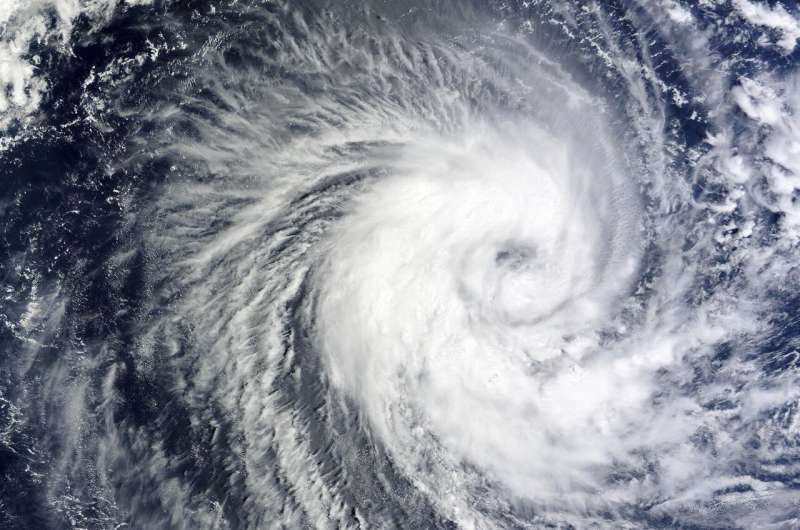This article has been reviewed according to Science X's editorial process and policies. Editors have highlighted the following attributes while ensuring the content's credibility:
fact-checked
peer-reviewed publication
trusted source
proofread
Investors underestimated risk, impact of hurricanes prior to feeling 'Superstorm' Sandy's fury on Wall Street

Weather experts are warning that this year's Atlantic hurricane season, which officially began June 1, could be among the most active on record. Hurricanes annually cause millions of dollars in damage to households and public infrastructure, but also to businesses.
Hurricanes and other extreme weather events also create spikes in uncertainty that can linger in financial markets for affected firms for months. Mispricing of such events in asset markets can lead to sudden sharp price corrections.
In a paper forthcoming in the Journal of Finance (available on the SSRN preprint server), Mathias Kruttli and Sumudu Watugala, assistant professors of finance at the Indiana University Kelley School of Business, studied firm-level exposures to hurricanes over a 24-year period to better understand how extreme weather events impact performance in financial markets as measured by option and stock prices.
They found that investors historically underreacted to the volatility arising from hurricanes and didn't efficiently update their expectations about it, based on information available in real time.
"After a hurricane, there is a lot of emphasis based on the damage and the resulting destruction, but what we wanted to highlight was that there's also a lot of uncertainty about the effects," Kruttli said. "At the moment of a hurricane landfall, a lot of that destruction is uncertain. Some firms will be negatively affected, certain firms will be positively affected, but it takes time for the uncertainty to be resolved."
This uncertainty may simply involve whether a hurricane makes landfall where it is expected to do so, or if its path veers away at the last moment and affects another area instead. It also can be based on the amount of time needed to discern the scope of the impact, both to companies' operations and the surrounding infrastructure, how product demand is affected and if and how insurance and disaster relief will aid recovery from the aftermath.
They used regression analysis to compare the change in uncertainty after a hurricane for firms that were hit, compared with those that were not. Their results show that uncertainty increases and remains elevated for up to three months.
Even though the extreme weather event has happened, it takes time for firms to assess and then communicate the impacts to investors, Watugala and Kruttli said.
As they examined the data from 1996 to 2019, the researchers found that investors appeared to become more aware of the potential uncertainty after experiencing Hurricane Sandy in 2012, and have, over time, reduced their underreaction to immediate hurricane risk.
"In general, what we found was that investors were systematically underreacting to how much uncertainty there would be about firm outcomes," Watugala said. "Sandy was an unexpected event that hit the U.S. financial center. There were very significant effects, like the closure of the New York Stock Exchange. It was very salient for a lot of financial investors."
Even though there have been historic and costly hurricanes such as Andrew in Florida in 1992, Katrina in New Orleans in 2005 and Ike in 2008, the financial markets underestimated the impact of hurricanes until Sandy hit the entire Atlantic Coast, from Florida to Maine, and its storm surge hit New York City hard, flooding streets and tunnels and cutting off power to millions.
"We find that the underreaction to hurricanes diminishes after Hurricane Sandy, suggesting that the informational efficiency of markets improved," the professors wrote in the paper. "A salient event inducing such a marked shift in the pricing of long-observed events like hurricanes calls into question whether financial markets can efficiently price novel risks stemming from climate change.
"Overall, our results suggest that markets need time to learn how to price extreme weather events and are unlikely to efficiently price novel climatic risks stemming from climate change," they added.
"Extreme weather events that are predicted to become more frequent and severe may not be diversified away by investors and could affect firms' cost of capital even if the events are local. One potential way to reduce the uncertainty associated with extreme weather events and increase pricing efficiency could be to require better firm disclosures related to the economic channels driving extreme weather uncertainty."
The paper also examines differential effects of hurricanes across industries. Extreme weather events disrupt supply chains or slow demand for products, but they also can present new opportunities, such as higher demands for power generators and construction materials. The authors found that mining firms, including those involved in oil and gas production, encountered higher uncertainty after hurricanes due to their fixed locations.
While their paper primarily analyzed the responses to hurricanes, the authors note that their findings are qualitatively similar for other natural disasters, such as tornadoes, snowstorms, floods, earthquakes and wildfires.
More information: Mathias Kruttli et al, The Price of Extreme Weather Uncertainty: Evidence from Hurricanes, SSRN Electronic Journal (2024). DOI: 10.2139/ssrn.3284517
Journal information: Journal of Finance
Provided by Indiana University





















